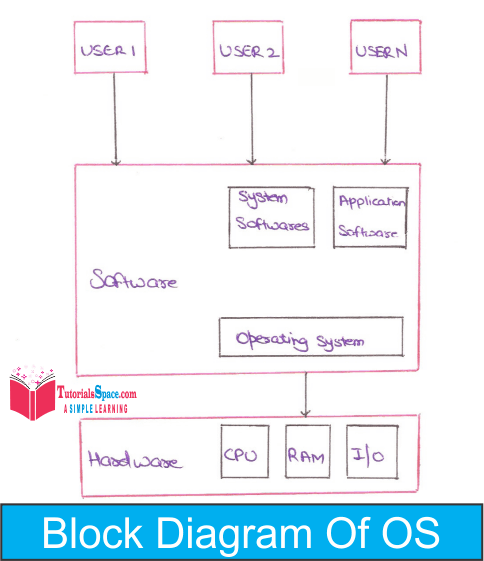
Operating System:
Operating System Functions And Characteristic:
An Operating System is a program that acts as an interface between user and the computer hardware and controls the execution of all kinds of programs. Functions of an Operating System:
Functions of an Operating System:
- Memory Management
- Process Management
- Device management
- File Management
- Security Of User Data and Files
- Control over System Performance
- Job Accounting
- Error Deletion aids
- Coordination between others Software and users
Memory Management:
It refers to Management of primary Memory. Main Memory is a large array of words or bytes where each word or byte has its own address.Main Memory provides a fast storage that can be accessed directly by the CPU. For a program to be executed , it must be in the Main Memory.
1) operating System keeps track of primary Memory , i.e. What parts of it are in used by whom, what part are not in use.
2) It multi Programming, the OS decides which process will get Memory when and how much.
3) allocates the memory when a process requests it to do so.
4) De-allocates the memory when a process no longer needs it or has been terminated.
Process Management:
In this OS decides which process gets the processor when and foe how much time. This function is called Process Scheduling. An Operating System does the following activities for Processor Management.• It Keeps tracks of processor and status of process.
• The program responsible for this task is known as Traffic Controller.
• It allocates the processor(CPU) to a process.
• It De allocates processors when a process is no longer required.
Device Management:
An Operating System manages device communication via their respective device-drivers. Operating System does:• Keep tracks of all devices. The Program responsible for this task is known as the I/O Controller.
• Allocate the device in the most efficient way.
• De allocate the devices.
File Management:
A file system is normally organized into directories for easy navigation and usage. These directories may contain file and other directories. Operating System does:• keep track of information, location, user, status etc. The collective facilities often as known as file system.
• decide who gets the resources.
• allocate the resources.
• de-allocate the resources.
Security:
By means of passwords and similar other techniques, it prevents unauthorized access to programs and data.Controls over System Performance:
Records delay between request for a service and response from the system.Job Accounting:
keeps track of time and resources used by various jobs and users.Error detection Aids:
Production of dumps, traces , errors, messages and others debugging and error detecting aids.Coordination between other software and users:
Coordination and assignment of compiler,Interpreters, assemblers and other software to various users of the computer systems.01-Operating System Functions - Operating System Tutorial For Beginners In Hindi
CLICK HERE TO Download This PDF NOTES
